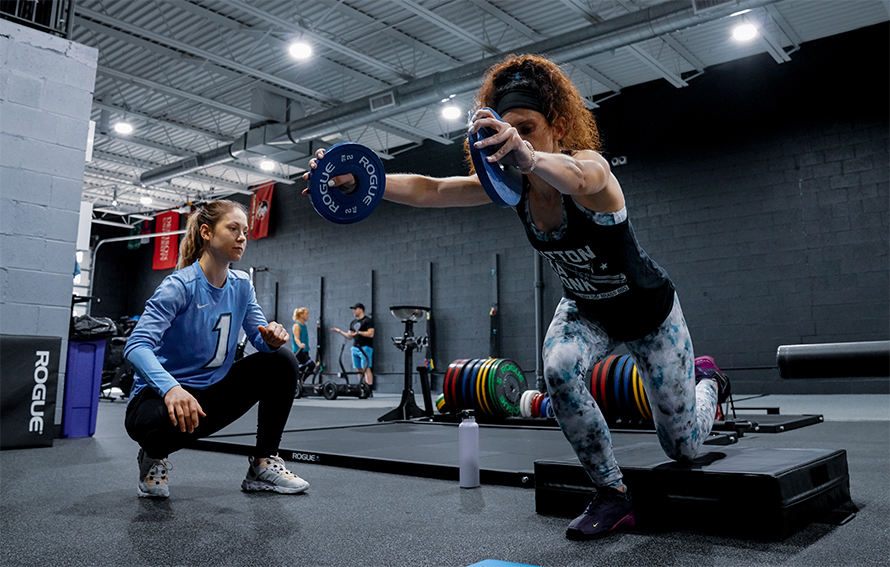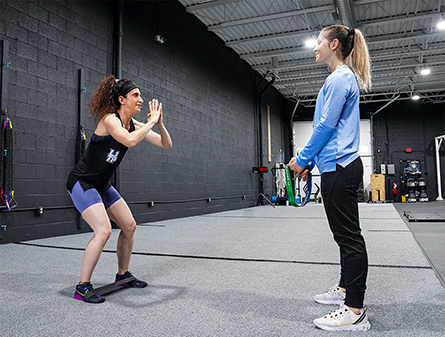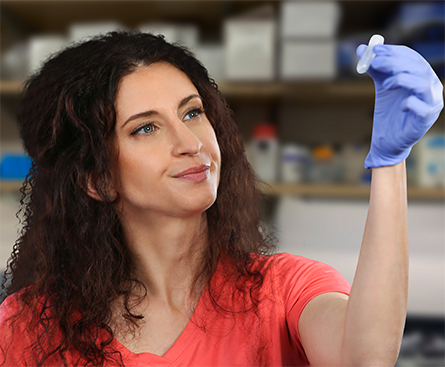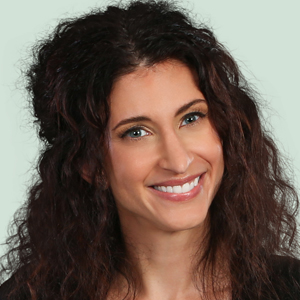Deadlifts and deadlines
I have adored both movement and science since I was a feral kid running around the north woods of New Hampshire, but I lacked role models for self-care and academic research. I only started working out regularly in my late twenties and didn’t start my Ph.D. program until 2019, seven years after earning my M.S. I worked as a consultant for two and a half years before taking a technician position at the University of Pittsburgh to help me decide if pursuing a Ph.D. was the right choice for me. (Spoiler alert: It was, and I’m so happy to be back in research.)
When COVID-19 restrictions were enacted in March 2020, losing bench research and group fitness classes simultaneously was devastating. (I cried a lot.) I did what I could: building a foundation in bioinformatics and annoying my downstairs neighbors with Zoom workouts at odd hours.

“Some meditate, some knit, and I LOVE squats.”
As my qualifying exams approached, my anxiety skyrocketed. I knew I needed a bigger physical outlet than my living room. The only way I could gain access to a gym and stay within my city’s COVID-19 safety measures was to train masked one-on-one with a personal trainer. I’m a petite five-foot-one-inch woman; weight training was an entirely foreign experience, and I loved it. It took me a little longer than others to discover my place in fitness and science, but I’m profoundly grateful for finding my passions.
I’m a Ph.D. candidate in Joel McManus’ lab at Carnegie Mellon University happily researching post-transcriptional regulation of filamentation in the fungus Candida albicans. When I’m not in the lab, I pick things up and put them down again. Strength training enhances my research and quality of life. I find so many complementary parallels between the lab and the gym.
Grit and resilience
According to numbers shared by USA Running and the National Science Foundation, about 10 times more people run marathons each year than earn science, technology, engineering or mathematics Ph.D.s, so let’s retire the old canard that doing a Ph.D. is a marathon. It’s harder. Scientific and physical training both demand tenacity.
When I started training, I couldn’t do a bodyweight pistol squat (a squat on one leg) to save my life. I literally went splat. Slowly, with help from my coach, Maddie, I worked on my strength and mobility. Eight months after my first attempt, not only can I do a full pistol squat but I can do it with weights.
For my thesis, I’ve been trying to transform C. albicans with a fluorescent marker since early June. It’s been more troubleshooting than I possibly could have imagined. I still have a long way to go with these experiments, but as I run my thumbs over the calluses on my palms from lifting, I have proof of my grit and resilience. I can do difficult things and succeed.

The power of ‘Why not?’
When my coach asks me if I want to increase the weight or reps, I chirp back, “Why not?” Sometimes I can complete the movement; other times it’s just not happening, but I’m OK with that temporary setback — it leaves space for growth. I understand that a movement unavailable to me today may be achievable in a few weeks or months.
Four years ago, I was working as a technician in an HIV lab. We were having terrible issues with a protocol. With a hard deadline approaching, I had a last-ditch “Why not?” moment and changed the method significantly. Shockingly, it worked, ultimately leading to my inaugural first-author publication.
“Why not?” has become my rallying cry in the gym, the lab and life. Up the weight, do the experiment, apply for the grant — it could be amazing.
It’s my journey
As a nontraditional, first-generation grad student, I struggle with imposter syndrome. In one instance, other graduate students were chatting innocently about their parents’ Ph.D. work and asked me where my family went to school. After I muttered “they didn’t,” the conversation awkwardly screeched to a halt, and I wanted to sink into the floor. I’ve been told directly and indirectly that I don’t belong in science more times than I can count. It’s exhausting.
I’ve never been intimidated by the professional and NCAA athletes at my gym, nor have I been anything less than wildly supportive of folks just starting out or rehabbing after injuries. Strength training shows me that everyone has their own journey and I simply need to do my own best research.
Glow together, grow together

at the bench,” Tosiano says. “Stepping out of my comfort zone is the scariest
and the best thing I've done.”
On the flip side, other people inspire me to be the best version of myself. Before she was my coach, Maddie and I both taught ballet barre classes. I was in awe of her skills as an athlete and instructor. Serendipitously, right as I was looking into personal training to combat my qualifying exam jitters, Maddie passed her certification and began coaching at LEG1ON Training & Performance, a gym in Pittsburgh. Now I’m profoundly grateful to call this incredible woman my coach and friend.
During one of my rotations, I met a biomedical engineering postdoc with fierce drive and wildly creative research. While that lab wasn’t the right fit for me, Corine and I established a writing group. Every Thursday morning, we camp out in the library for a couple of hours, catching up on all the writing that gets away from us during the week. Accountability and support make writing group one of my most productive times during the week. Everyone has something to share, so I relish the opportunity to grow with people I admire.
Do the scary thing
I can get a great workout on my own or in a group fitness class, but strength training is one of the most challenging things I’ve ever done. It’s a uniquely intense experience where discomfort is the goal. Imagine throwing your body weight over your head or stepping backward into a heavy lunge without seeing what’s behind you. Despite knowing my coach will keep me safe, I still feel a rush of “I’m going to die” adrenaline. I empty my mind, slow my breath and focus on how my body weight distributes across the soles of my feet. It’s a rehearsal for real-life scary moments.

as a Ph.D. student at Carnegie Mellon.
These mindful practices came in clutch during my Zoom proposal defense. I’ve never experienced such an intense line of questioning. Concentrating on breathing with my diaphragm and connecting my feet to the kitchen floor helped me keep calm and carry on.
Finding my joy
I’ve been asked a lot of silly questions. “Why are you going back to school?” “Why are you getting up at 6 a.m. to work out before lab?” “Why did you spend five months troubleshooting an arcane protocol that nobody has used since 2014?”
For me it’s all about joy. The pure elation of doing something new and challenging is how I live my best and most fulfilling life.
Strength training reflects everything I love about research: the challenge, the people, the thrill of a new discovery. No matter what your physical practice, I firmly believe that any time spent on fitness directly benefits your research. I think we should all make time to take care of ourselves. Why not?
Tell us your wellness story
Have you started a new practice to care for your body, mind or spirit during the pandemic that you intend to continue into the future? What keeps you well? Exercise? Sleep? Faith? Family? Pets? Something else?
Write about what works for you and/or your wellness challenges for our annual Wellness Issue. We’ve extended the deadline to Oct. 29.
Email your essay to ASBMB Today, with the subject line “Wellness.”
Enjoy reading ASBMB Today?
Become a member to receive the print edition four times a year and the digital edition monthly.
Learn moreGet the latest from ASBMB Today
Enter your email address, and we’ll send you a weekly email with recent articles, interviews and more.
Latest in Opinions
Opinions highlights or most popular articles

Women’s health cannot leave rare diseases behind
A physician living with lymphangioleiomyomatosis and a basic scientist explain why patient-driven, trial-ready research is essential to turning momentum into meaningful progress.

Making my spicy brain work for me
Researcher Reid Blanchett reflects on her journey navigating mental health struggles through graduate school. She found a new path in bioinformatics, proving that science can be flexible, forgiving and full of second chances.

The tortoise wins: How slowing down saved my Ph.D.
Graduate student Amy Bounds reflects on how slowing down in the lab not only improved her relationship with work but also made her a more productive scientist.

How pediatric cataracts shaped my scientific journey
Undergraduate student Grace Jones shares how she transformed her childhood cataract diagnosis into a scientific purpose. She explores how biochemistry can bring a clearer vision to others, and how personal history can shape discovery.

Debugging my code and teaching with ChatGPT
AI tools like ChatGPT have changed the way an assistant professor teaches and does research. But, he asserts that real growth still comes from struggle, and educators must help students use AI wisely — as scaffolds, not shortcuts.

AI in the lab: The power of smarter questions
An assistant professor discusses AI's evolution from a buzzword to a trusted research partner. It helps streamline reviews, troubleshoot code, save time and spark ideas, but its success relies on combining AI with expertise and critical thinking.

